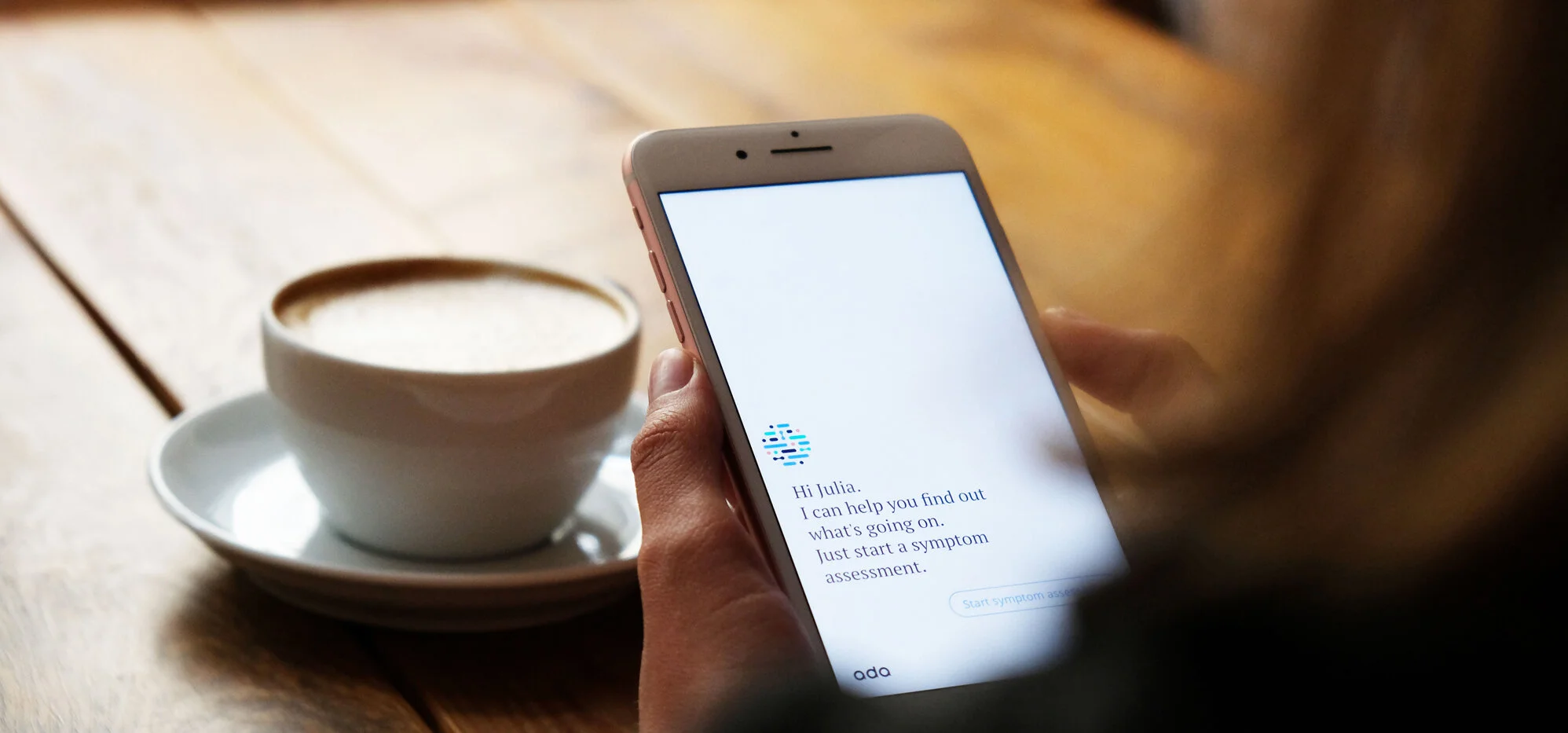“Product Design Director • Ada Health • 2020”
My role in brief
- Recruited and mentored a team of 12 Product Designers
- Translated regulatory requirements into best practices and ways of working
- Built and maintained cross-functional partnerships
When I joined Ada in May 2019, the scaling healthtech company was looking to bolster its in-house experience design capabilities, which at the time comprised of only one full-time Product Designer, plus another junior designer on a short-term contract.
Reporting to the VP Product Design, my challenge at Ada has since been to build, grow, and shape a Product Design discipline advocating for an experience-focused mindset.
Assembling a team of highly talented individuals
One of my first tasks was to grow the team by identifying resource needs and skill gaps across several delivery teams and rapidly addressing those needs.
Spent significant time interviewing Product Owners, discipline experts from Engineering to Compliance, and business leadership to learn about strategies and priorities for the different parts of the business.
Developed a proposal for how Product Design would contribute to driving Ada forward against our vision.
Based on learnings from these conversations, I completely redesigned the recruitment process to help source, screen, interview, and ideally sign the best talent in Berlin and London, two characteristically different markets regarding maturity and talent pool.
Some of the changes introduced are:
A skills matrix, which translates needs across the product teams into traits the Product Design team as a whole should comprise.
Job specifications for Product Designers, weighted for UX and UI, to focus on sub-sets of the overall skills matrix during recruiting and, later on, resourcing.
An interview process where candidates meet me as the hiring manager early on and subsequently spend time with a small cross-functional group to confirm fit based on an in-person portfolio review.
Over the following six months, I built out a robust talent pipeline and successfully recruited an additional ten incredibly talented Product Designers to join Ada.
Product Designers among a group of new starters on their first day
Software as a Medical Device
A change in regulations for Software as a Medical Device introduced new requirements for Medical Safety, Risk Mitigation and Quality Assurance as part of Ada's Software Development Life Cycle. These requirements needed translating into ways of working for designers as members of the delivery teams and partners to quality management stakeholders.
The resulting Design Controls are the foundation to ensure product quality and safety:
Establish User Needs and Intended Use of our products in collaboration with experience researchers, product owners, and risk managers
Define clear, objective, measurable Design Inputs (i.e. product requirements)
Formally review elements of the design throughout the design and development process with reference to Design Inputs
Prove that Design Outputs meet User Needs and product requirements via Design Validation of release candidates once development is completed
Integrating risk management activities into our ways of working, we address potential risk factors early. By shifting our focus to what is best for the person using our products, compliance becomes a natural by-product.
Rather than seeing them as overhead limiting innovation and speed, we treated these regulations as an opportunity to create and leverage strong, safe product design principles.
Defining growth for Product Designers at Ada
For Product Designers to understand and track how they are progressing as an ‘individual contributor’, and what's expected of them to advance in their career, I developed a progression framework.
Aligned with the Engineering group's existing framework, it’s an adaptation more suitably reflecting a Product Designer’s unique skill set and their career path at Ada.
Progression framework in Trello, inspired by Clearleft
Wearing multiple hats
As a Servant Leader, I mentor the team, empower them to impact both the individual product strategies and larger business strategy, and help manage their workload where necessary.
Regular 1-to-1s provide a trusted space to discuss performance, growth opportunities, and overall team health.
The bi-weekly Product Design Assembly serves as forum for team bonding, sharing, and learning.
As a Craft Expert, I participate in quarter planning sessions, design critiques, and formal design reviews to inspire designers to do their best work possible. Drawing from 10+ years of hands-on experience in various Product Design roles, I provide constructive feedback to the team and experience design guidance to peers across the company.
Support to senior management by aligning product-level decisions with the company's strategic direction
Design quality assurance to meet highest compliance and regulatory standards.
When needed, player-coach who rolls up their sleeves and picks up the tools.
As a Manager of the discipline, through frequent check-ins with the respective Engineering Leads and Product Owners, I balance product requirements and business priorities with skills and capacities in the Product Design chapter for effective resource distribution.
Quarter planning session with one of the product teams
Building and cultivating cross-functional, as well as external partnerships
Beyond my responsibilities regarding the team, I am a partner to other functions across the business.
In alignment with the VP Product Design and the Experience Research Director, I translate business strategy into a consistent experience design approach across the different product domains. I am also the voice of Product Design, contributing learnings from the product verticals in strategic reviews.
A close working relationship with Marketing Design serves to guarantee a consistent brand experience in behaviour, look, and voice across our products and other touchpoints of the brand ecosystem.
I also bring an experience design perspective to conversations with potential external partners, such as Labor Berlin, whom we helped to improve the efficiency of their COVID-19 testing process.
Product quality and safety
As member of the working group for product quality and safety — alongside representatives from Product, Risk Management, Medical Safety, Clinical Evaluation, and Regulatory Affairs — I define product requirements in the context of Ada's quality management system (QMS) to prepare for, as well as participate in, external quality audits.
In a heavily regulated environment, I push for creative, human-centred solutions to challenging design problems.




